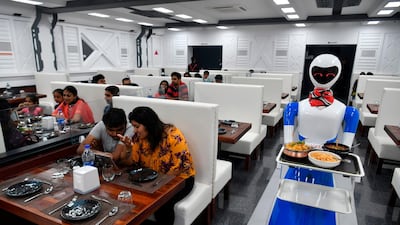Over the past decade, a robotics revolution has captured the world’s imagination, with profound implications for economies, governments, people and employment.
Robots are showing up everywhere, but it’s not the apocalyptic uprising you see in Hollywood movies. Since 2010, the global stock of industrial robots has more than doubled. Likewise, innovations in engineering and machine learning portend an accelerated adoption of robots in service sector occupations over the next five years.
It is estimated that by 2030, up to 20 million manufacturing jobs worldwide could be displaced due to robotisation. Countries included in this estimate account for more than 90 per cent of industrial robot installations: EU, US, Japan, South Korea, Australia, China, Taiwan, Thailand, Mexico, India, Canada, Singapore, Brazil, Turkey, and Malaysia.
The world is preparing for a digital change, and the nations running the race to finish at the top levels for robotics and AI are Germany, Singapore and South Korea. In our region, the UAE is leading the Arab world in its approach to the adoption of 'smart technologies' – especially in terms of government participation. This is seen through the adoption of the UAE Strategy for the Fourth Industrial Revolution in 2017, the appointment of the world's first Fourth Industrial Revolution (4IR) ambassador and more recently, the announcement of the Dubai Future District, with a Dh1 billion fund to support "New Economy Companies". The Dubai Future District will be the Middle East's largest district dedicated to developing the new economy.
Saudi Arabia is also witnessing rapid developments in innovation and the adoption of 'smart technologies'. Under the patronage of Crown Prince Mohammed bin Salman, the Global Artificial Intelligence Summit 2020 will be held in the Kingdom next month. The summit is part of Saudi Arabia's plan to become a leader in AI technology and drive discussions and partnerships between local and international stakeholders in the AI field.
Robots are steadily gaining traction in specific segments of the service economy – such as healthcare, retail, hospitality, transport, construction and farming. One key consideration for anticipating the pace of robot deployment in service industries is the environment in which these robots may be asked to operate — in particular, the extent to which service jobs include repetitive functions. Jobs like warehouse work are in imminent danger, while other jobs in less structured environments will likely be carried out by humans for decades to come. It will be difficult for machines to replace humans in service sector occupations that demand compassion, creativity, and social intelligence. Physical therapists, dog trainers and social workers are likely to remain secure in their jobs.
In the accountancy profession, there has, of course, been fear that robots will increasingly take over tasks, leaving little for human accountants to do. While these systems do not replicate human intelligence, they could, in future, produce outputs that far exceed the accuracy and consistency of those provided by humans. However, we believe that instead of replacing accountants, more intelligent systems will instead help accountants to provide more insight and move further up the value chain.
The effects of job losses due to robotisation will vary significantly around the world and within countries. The adverse effects of robotisation are disproportionately felt in the lower-income regions of the globe’s major economies. On average, a new robot displaces nearly twice as many jobs in lower-income regions – this finding has significant social and political implications.
Ethics has also become a hot topic in the last year or two, and it’s not hard to see why. The seismic technological developments currently taking place are both exciting and morally concerning. What happens when machines do our thinking and decision-making for us? Where does the buck stop and who is accountable? Getting to grips with these issues is vital if we are to protect people, safeguard professional reputations and maximise the potential benefits from technology.
Preparing for and responding to the social and economic impacts of automation will be a defining challenge of the next decade. Policymakers, business leaders, technology companies, educators, and workers all have a role to play in creating an ethical framework to increase trust and confidence, with clear accountability backing it up.
The potential impact of technology on industry and the labour market is clear, but it should not be cause for alarm. The greater adoption of robotics will be a boon for businesses with an impactful global change.
Therefore, rather than being afraid of technology or merely accepting it, we must embrace the change that is coming.
Michael Armstrong is the Middle East, Africa and South Asia regional director for the Institute of Chartered Accountants in England and Wales

